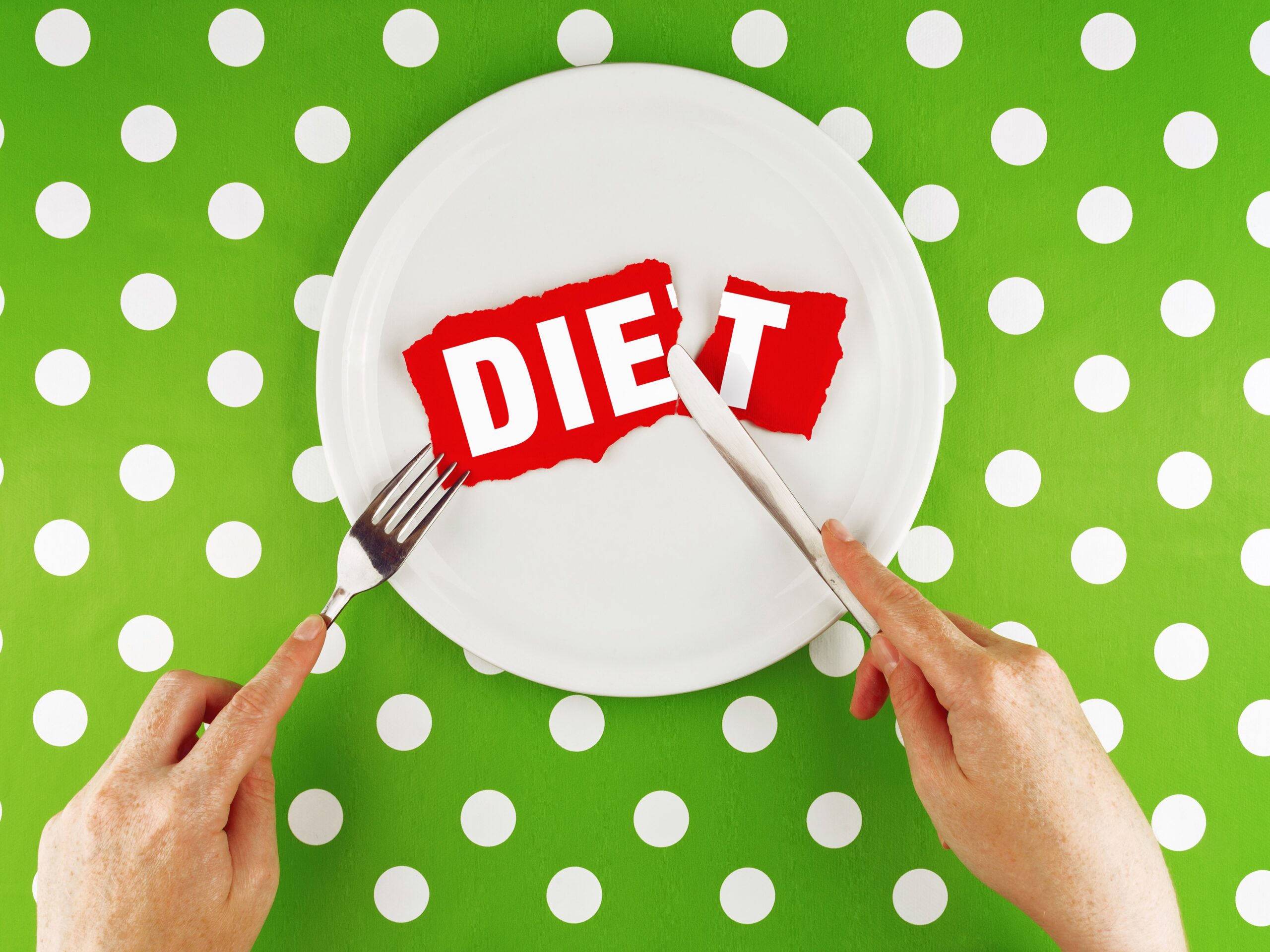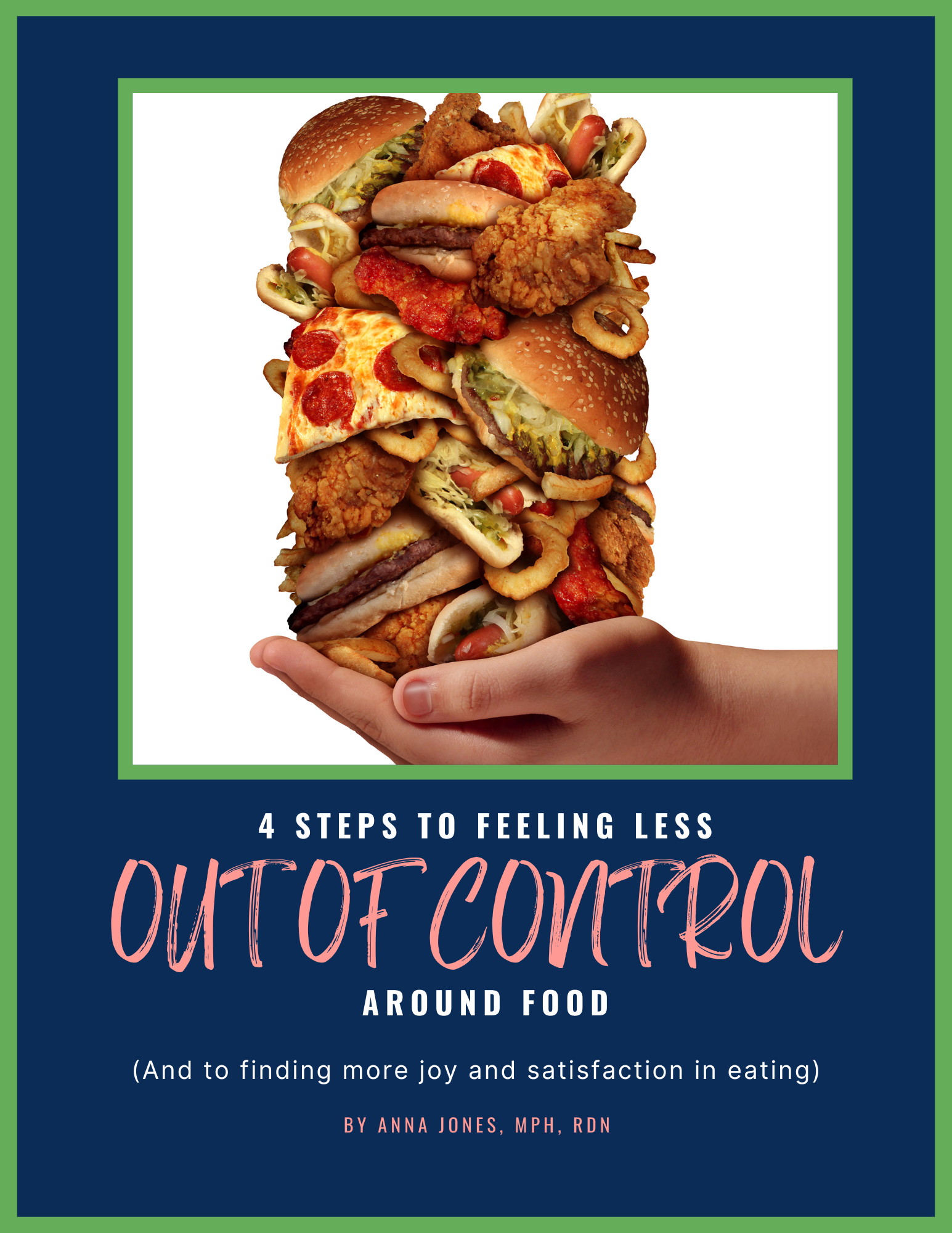*Trigger warning- This blog post briefly discusses topics related to weight loss and restricting calories. It also mentions specific calorie amounts. It may be triggering for those with disordered eating or an eating disorder.

If you’ve ever been on a diet, chances are you have tried a low-calorie diet. At the beginning, the question always is- “How many calories should I eat to promote weight loss?” At a quick glance, there are tons of influencer videos, blog posts, and Instagram posts recommending daily calorie goals of 1,200-1,500 calories for weight loss. I have even seen diets out there that recommend as little as 1,000 calories.
There is one HUGE problem with those calorie recommendations- THAT RANGE IS WAY TOO LOW FOR AN ADULT. Way too low. To put it in perspective, a toddler needs approximately 1,000-1,400 calories to provide enough energy for their small bodies.
When you limit yourself to 1,200 calories (even 1,400-1,600 calories), you’re NOT providing enough energy to your body. Not to mention, even if you eat the “perfect” diet (and there is no “perfect” diet), you would be putting yourself at risk for nutritional deficiencies including malnutrition. It does not matter what your starting weight is- if you do not eat enough food to meet your body’s needs, you CAN become malnourished.
So, what happens to your body physically when you do not eat enough calories? Your body only stores so much energy in your muscles and liver in the form of glucose. Once your body uses up the energy it gets from eating food, it will start to use the stored glucose to power your body’s functions (kind of like a battery in a phone after you have taken it off of a charger). Once the glucose is gone, your body starts to break down both protein from your diet and protein stored in your muscles and turns it into glucose.
While initially, this might not seem like a problem, it can be a very significant issue later on down the road. If your body continues to have to break down your muscles for energy, that puts both your heart and lean muscle (the muscle that allows you to walk, run, dance, lift things, etc.) at risk. When you think about it, the strategy you are using to lose weight (most likely with the goal to improve your health) might actually be putting your health at risk.
5 Signs You’re Not Eating Enough
Luckily, your body is really great at letting you know when it is not getting enough energy through food. It wants to make sure that it receives everything it needs to survive. When it comes down to it, your body does not know the difference between intentional dieting and semi-starvation. When it does not get enough energy through food, it thinks it does not have access to food and goes into survival mode. The following symptoms are meant as red flags to you that you need to eat more to survive.
1. You’re constantly tired.
You can probably guess why this might happen if you’re not eating enough to match your body’s needs. Let’s bring back the cellphone example. If you do not recharge your battery, your cellphone’s functioning may start to slow down as it reaches a low battery level. Maybe the screen even darkens to help extend your battery life. Your body is very similar. If you do not provide it with enough energy to do your daily activities, it begins to slow down because it does not have enough energy to power itself, leaving you feeling tired.
2. Your mood has been horrible.
This symptom ties in pretty well with feeling tired all of the time. Your mood is fairly dependent on your mental and physical energy levels. Let’s break that down. If you do not have enough physical energy, you will not be able to do activities that you enjoy (or it will be harder to enjoy them). This might affect your ability to complete important tasks or focus on conversations. The frustration alone from experiencing difficulty navigating your day-to-day life is enough to make anyone cranky.
3. You feel hungry all of the time (and think about food all day, every day).
Your body does its best to let you know when you need more energy. If you’re running low on food (especially carbohydrates), it sends out a bunch of signals to your brain and stomach to let you know, “Hey, I’m hungry. I need food.” If you continue to not get enough energy (because you’re trying to stick to that low-calorie diet), it will continue sending out signals. As these signals accumulate throughout the day, your hunger level grows, making you feel like you’re hungry all of the time. For some people, they struggle to notice their hunger signals for various reasons (such as trauma). If this is you, you may find yourself instead thinking about food all of the time. It makes sense that you would think about food. Your body is basically waving you down with flares, begging you to eat.
4. You’re losing a lot more hair than normal.
Your body is great at self-preservation. It does whatever it needs to in order to make sure you continue breathing. There are certain organs in your body that only use carbohydrates for energy, specifically your brain. You already learned that your body will start to tranform protein into energy. However, if your body’s protein is being used for energy, there will not be enough for one of its main jobs- to build things like your hair. Your body will stop doing what it deems as “unnecessary” tasks in order to keep you alive- which is why you experience hair loss if you do not eat enough.
5. You’re often sick.
The nutrients in your food have a lot of functions. One of those functions is fighting off infections from viruses or bacteria or helping you to heal faster. If you find yourself catching a cold a lot more than normal, it might be a good indication that your body is not getting the vitamins and minerals it needs to keep you healthy from food. Likewise, you might find yourself staying sick longer than the people around you. That’s because your body needs a ton of energy and protein (from food) to support your immune system in fighting off the illness.
4 Strategies to Help You Provide Your Body with Enough Food
You are a unique individual with unique energy needs. How much food your body requires will be different from that of your partner, friends, and family. Not to mention, the amount of energy your body needs on a daily basis tends to change quite a bit throughout the week. For that reason, I cannot provide you with a blanket statement of, “You should be eating X number of calories each day.” Instead, here are four tips to help you become more in tuned with your body and to provide it with enough energy from food.
1. Aim to eat a meal or snack at least every 3-4 hours.
If you’ve been following a low-calorie diet for a long period of time, the idea of eating more often and more food might be slightly terrifying. This totally makes sense! You’ve gotten into the habit of eating only so much during the day, even when you feel hungry. One way to get in the habit of eating more is having a meal or snack every 4-6 hours. On average, it takes up to 6 hours for your liver to use up all of its backup energy stores. Usually when this happens, you probably experience symptoms of extreme hunger (or what I like to call “hangry”). These signs of extreme hunger can make it really difficult to focus or complete whatever activity you are doing at the time. For that reason, try to have a meal or snack at least every 3-4 hours (going no longer than 6 hours between meals). You may even feel better eating every 2-3 hours and that is okay, too! Which leads me into my next strategy.
2. Learn what your early hunger signals feel like (and eat in response to them).
Dieting or calorie restriction for any amount of time is going to make it harder to recognize your hunger signals. When you eat less than what your body needs, your body will let you know that requires more food by sending out hunger signals. This might feel like:
- your stomach grumbling,
- feelings of lightheadedness or dizziness,
- difficulty concentrating on activities,
- changes in mood (again, think hangry),
- and constantly thinking about food.
The more that you ignore these signals in order to stay within your calorie goal, the weaker these signals become. Eventually, you do not notice your hunger until you feel ravenous, or experience extreme hunger. This extreme hunger becomes your new “normal”. As you begin to eat more again, you may notice those hunger signals a lot sooner and more frequently. THIS IS NORMAL (so please be kind to yourself). You have been ignoring your signals for so long that you stopped noticing the early signs of hunger. By eating more food more often, those early signals will become louder, which will allow you to become more in tuned with your body’s energy needs.
3. Avoid ignoring your hunger by drinking fluids.
If you google any low-calorie diet, one of the biggest tips they provide to help ignore your hunger is to drink fluids, specifically water. Over time, you may have developed the habit of drinking coffee, tea, or diet pop to help you get between meals as well. This strategy is effective at masking your hunger, because it temporarily tricks your stomach into thinking it’s full. Likewise, the caffeine in some beverages can act as an appetite suppressant, making you feel less hungry. Unfortunately, one of the side effects of using beverages to mask your hunger for so long is that you become out of sync with your body. It becomes more challenging to recognize your hunger signals, because they have been silenced from drinking fluids. If you regularly mask your hunger by drinking fluids, do your best to honor your hunger instead. Rather than only drinking coffee in the morning for breakfast, have a meal AND coffee. Rather than avoiding snacks between meals by drinking water, have a snack AND water.
4. Have a snack before and/or after physical activity.
Do you ever feel like you’re dragging during physical activity? You’re so low on energy that completing your activity seems more like a chore than something you actually enjoy doing. This can be a huge red flag that you’re not eating enough during the day. Remember how your liver uses up its energy stores within 6 hours? During physical activity, your muscles burn through their energy stores, too! If they do not have the required back-up energy from the liver, your body will have very limited energy that it can use to power your physical activity. This is why movement feels almost like a chore- your body does not have enough energy to sustain the movement. Instead of moving on an empty stomach, have a snack (with at least carbohydrates) before the activity and a meal or snack (with carbohydrates, fat, and protein) after the activity. This will both provide your body with the energy it needs to move AND with the energy that it needs to repair and replenish itself when you’re done.
With the societal pressure to look a certain way paired with how difficult weight loss is to achieve, it makes sense that following a low-calorie diet might seem appealing. However, it is so important to take into consideration what you might be risking or losing by limiting your calories to that low of a level. Your long-term health is worth protecting (no matter your weight or body size). Please consider giving your body what it needs- enough energy through food.
*Disclaimer- The information in this post is meant for educational and entertainment purposes only. It is not intended for the diagnosis of disordered eating or an eating disorder. You should always contact your attending clinicians about your unique case.



